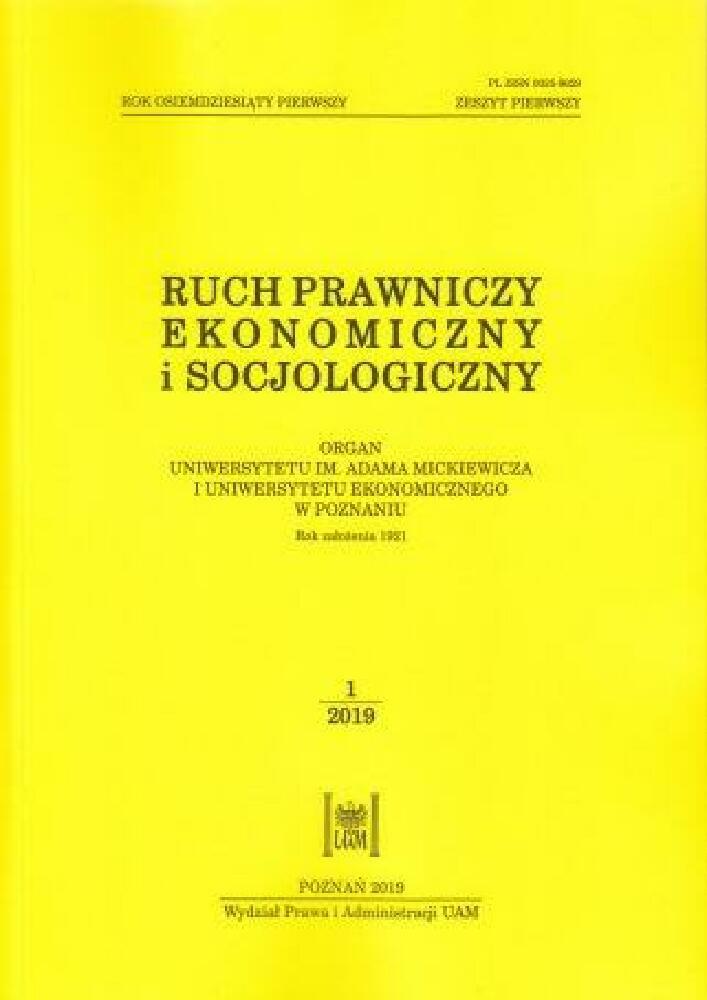Abstract
Conviction for a crime raises a number of legal consequences not only for the convicted person, but also for those who are in a family or professional relationship with this person, as well as for the victims of crime. However, the existing regulations applicable to adjudication in criminal matters do not require consideration of the influence of the conviction on the situation of third parties. This fact justifies an attempt to investigate whether the legal system protects these persons from the negative influence of a conviction, and from the effect of the use of instruments of criminal punishment on their family and property, and whether the consequences of a conviction for third persons should be taken into account by the court in the process of adjudication regarding the response to a crime. The author also attempts to formulate a statutory requirement for the criminal court to take into account the individual and social consequences of a conviction, including the consequences of the use of punitive measures, referring in particular to the problem of equality under the law and proportionality of the criminal punishment to the harm suffered by third parties
in the event of its application.
Funding
Faculty of Law and Administration of the Adam Mickiewicz University
References
Ashworth, A. (1993). Victim impact statements and sentencing. Criminal Law Review 7: 498–509.
Falandysz, L. (1980). Pokrzywdzony w prawie karnym i wiktymologii. Warszawa.
Fischer, T. (2018). Strafgesetzbuch und Nebengesetze. München.
Hryniewicz-Lach, E. (2017). Ofiara w polskim prawie karnym. Interesy ofiary przestępstwa i karno-materialne instrumenty służące ich zabezpieczeniu. Warszawa.
Jescheck, H.H., Weigend, T. (1996). Strafrecht. Allgemeiner Teil. Berlin.
Jończyk, J. (2001). Prawo zabezpieczenia społecznego. Kraków.
Lelental, S. (2017). Kodeks karny wykonawczy. Komentarz. Warszawa.
Mestek-Schmülling, K. (2004). Mittelbare Straftatfolgen und ihre Berücksichtigung bei der Strafzumessung, Berlin.
Moore, M. (2000). Opfer und Vergeltung: Eine Erwiderung auf George P. Fletcher, [w:] B. Schünemann, M.D. Dubber (Hrsg.), Die Stellung des Opfers im Strafrechtssystem. Neue Entwicklungen in Deutschland und in den USA. Köln–München: 85–103.
Sadurski, W. (1978). Równość wobec prawa. Państwo i Prawo 33(8–9): 51–64.
Sadurski, W. (1988). Teoria sprawiedliwości. Podstawowe zagadnienia. Warszawa.
Satzger, H., Schluckebier, W., Widmaier, G. (2017). Kommentar zum Strafgesetzbuch. München.
Stefańska, B.J. (2008a). Prawne i społeczne skutki skazania. Wojskowy Przegląd Prawniczy 1: 86–100.
Stefańska, B.J. (2008b). Prawne i społeczne skutki skazania. Wojskowy Przegląd Prawniczy 2: 58–72.
Waszczyński, J. (1968). Prawne skutki skazania. Państwo i Prawo 23(11): 807–818.
Wojtyczek, K. (1999). Zasada proporcjonalności jako granica prawa karania. Czasopismo Prawa Karnego i Nauk Penalnych 3(2): 33–51.
Wróbel, A., Zoll, A. (2016). Kodeks karny. Komentarz. Warszawa.
Zajączkowska, J. (2018). Aspekty prawne kontaktów z dzieckiem. Ruch Prawniczy, Ekonomiczny i Socjologiczny 80(1): 269–284.
Zakolska, J. (2008). Zasada proporcjonalności w orzecznictwie Trybunału Konstytucyjnego. Warszawa.
License
Copyright (c) 2019 WPiA UAM

This work is licensed under a Creative Commons Attribution-NonCommercial-NoDerivatives 4.0 International License.





